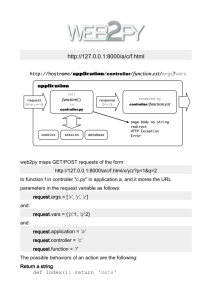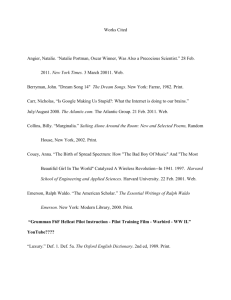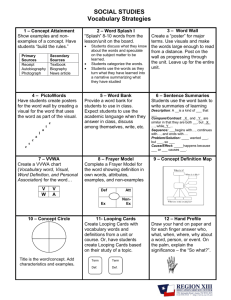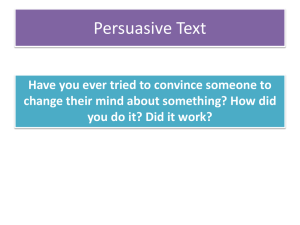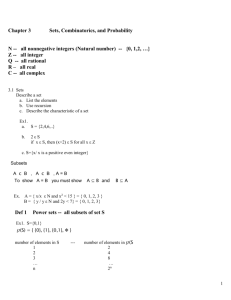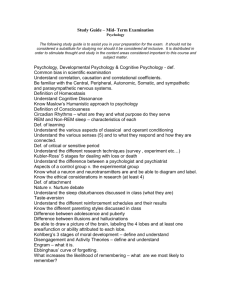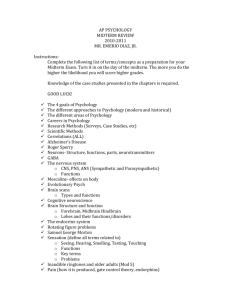11APPL - Vocab 3A-B Hmwk
advertisement
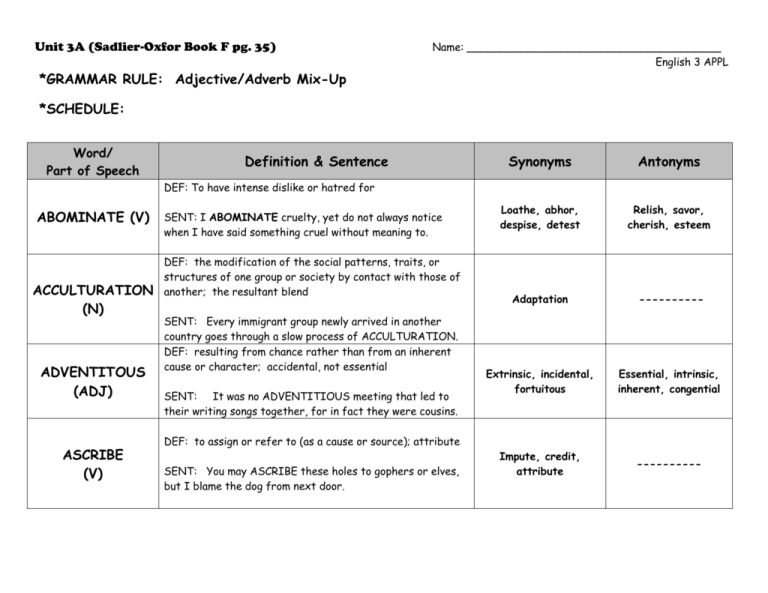
Unit 3A (Sadlier-Oxfor Book F pg. 35) Name: ______________________________________ English 3 APPL *GRAMMAR RULE: Adjective/Adverb Mix-Up *SCHEDULE: Word/ Part of Speech Definition & Sentence Synonyms Antonyms Loathe, abhor, despise, detest Relish, savor, cherish, esteem Adaptation ---------- Extrinsic, incidental, fortuitous Essential, intrinsic, inherent, congential Impute, credit, attribute ---------- DEF: To have intense dislike or hatred for ABOMINATE (V) ACCULTURATION (N) ADVENTITOUS (ADJ) ASCRIBE (V) SENT: I ABOMINATE cruelty, yet do not always notice when I have said something cruel without meaning to. DEF: the modification of the social patterns, traits, or structures of one group or society by contact with those of another; the resultant blend SENT: Every immigrant group newly arrived in another country goes through a slow process of ACCULTURATION. DEF: resulting from chance rather than from an inherent cause or character; accidental, not essential SENT: It was no ADVENTITIOUS meeting that led to their writing songs together, for in fact they were cousins. DEF: to assign or refer to (as a cause or source); attribute SENT: You may ASCRIBE these holes to gophers or elves, but I blame the dog from next door. DEF: roundabout; not direct CIRCUITIOUS (ADJ) COMMISERATE (V) ENJOIN (V) SENT: I followed a CIRCUITIOUS path through the woods, not because I feared pursuit, but because I was lost. DEF: to sympathize with, have pity or sorrow for, share a feeling of distress SENT: The family COMMISERATED with her after the loss of her old and faithful dog. DEF: to direct order; to prescribe a course of action in an authoritative way; to prohibit SENT: I ENJOINED them to stop spending so much money or to face the consequences. Indirect, meandering, winding Straight, direct, “as the crow flies” Feel sorry for, empathize Feel no sympathy for Bid, charge, command, adjure Allow, permit Accelerate, facilitate, speed up Hinder, hamper, impede, obstruct Redeem, atone, make amends for, make reparations ------------- Commotion, turmoil, unrest Peace and quiet, tranquility, placidity DEF: to make easy, cause to progress faster EXPEDITE (V) SENT: The pleasant background music did not EXPEDITE my work but instead, distracted me. DEF: to make amends for; make up for; to avert EXPIATE (V) SENT: They seemed more than willing to EXPIATE their guilt by whatever means necessary. DEF (N): a state of great excitement, agitation, or turbulence FERMENT DEF (V): to be in or work into such a state; to produce alcohol by chemical reaction SENT: Caught in the FERMENT of revolution, the young men enlisted with the local militias. The grapes were FERMENTED in order to produce wine. Unit 3A (Sadlier-Oxfor Book F pg. 35) Name: ______________________________________ ENGLISH 3 APPL SYNONYMS (5pts.): Write the vocabulary word that is a synonym for the underlined/bolded word. 1) Charge both sides to negotiate ____________________ 6) Empathize with your disappointment ____________________ 2) Speed up registration process ____________________ 7) The turmoil of opening night ____________________ 3) A motive attributed to me ____________________ 8) A fortuitous sequence of events ____________________ 4) The adaptation of exchange students ____________________ 9) Detest homework ____________________ 5) To atone for her unkindness ____________________ 10) A roundabout answer ____________________ ANTONYMS (4 pts.): First write a word that you know that means the opposite of the underlined/bolded word. Then, try and match a vocab word that has the same general meaning to your word. The words acculturation, ascribe, and expiate are NOT used. 1) A state of tranquility ___________________ 5) To allow a choice ____________________ 2) To cherish everything about her ____________________ 6) To impede on the delivery ____________________ 3) To feel no sympathy for the prisoner _________________ 7) A direct route home ____________________ 4) An essential meeting ____________________ COMPLETE THE SENTENCES (5pts.): (A) Identify any context clues that could help you decide which vocabulary word best fits the sentence. (B) Fill in the blank with the vocabulary word. Each word is only used once. EXAMPLE: When I hurt my back bungee jumping, my mom tried to ASSUAGE , or alleviate, the pain by giving me a massage and Tylenol. 1) He _________________________ the crime committed during his youth by a lifetime of service to humanity. 2) Declaring the boycott to be illegal, the judge _________________________ the labor union from applying it against the employing firm. 3) Wines from that part of France are produced by _________________________ the juice of the luscious grapes that grown on the hillsides. 4) No matter what their other likes and dislikes are, all Americans thoroughly _________________________ slavery in all forms. 5) Certain languages such as Afrikaans are the product of _________________________ and were created when two societies merged. 6) Some people say that they cannot understand her defeat in the election, but I _________________________ it to her failure to discuss the issues in simple, down-to-earth terms. 7) His lines of questioning were so _________________________ that I began to suspect that he was not sure of what he was trying to prove. 8) The new computerized referral system will greatly _________________________ the processing of complaints by customers. 9) Only someone who has suffered from bursitis can fully _________________________ with me when I am in the throes of an acute attack. 10) We must distinguish between the truly basic policies of our political party and those that are _________________________ and have little connection with the essential program. GRAMMAR (6pts.): ADJECTIVE/ADVERB MIX-UP: Underline the word that the adverb/adjective selection is modifying. Then circle the word in its correct adjective or adverb form. 1) Richard talks (careless / carelessly). 2) The ocean air smells (fresh / freshly). 3) I am (sure / surely) that you were at the party. 4) She did really (good / well) on that mat test. 5) The student wanted to finish her homework (quick / quickly). 6) Todd was very (sneaky / sneakily); he crept by the guard without being noticed. 7) The student was in such a hurry that she did (bad / badly) on the assignment. 8) The girl sang (beautiful / beautifully). 9) The classroom was very (noisy / noisily). 10) Whoever made the cake did a (wonderful / wonderfully) job. 11) She answered the question (incorrect / incorrectly). 12) The flowers smelled (good / well)/ well). EXTRA CREDIT WORD BANK ABOMINATE ACCULTURATION ADVENTITIOUS ASCRIBE CIRCUITOUS COMMISERATE ENJOIN EXPEDITE EXPIATE FERMENT EXTRA CREDIT ACROSS 4 to make amends for; make up for; 5 to assign or refer to (as a cause or source); attribute 6 a state of great excitement, agitation, or turbulence OR to be in or work into such a state; to produce alcohol by chemical reaction 8 to sympathize with, have pity or sorrow for, share a feeling of distress 9 the modification of the social patterns, traits, or structures of one group or society by contact with those of another; the resultant blend 10 roundabout; not direct DOWN 1 To have intense dislike or hatred for 2 resulting from chance rather than from an inherent cause or character; accidental, not essential 3 to make easy, cause to progress faster 7 to direct order; to prescribe a course of action in an authoritative way; to prohibit ANSWER KEY SYNONYMS/ANTONYMS 1) FJF 2) F ANSWER COMPLETE THE SENTENCES 1) f Unit 3B (Sadlier-Oxfor Book F pg. 35) Name: ______________________________________ English 3 APPL *GRAMMAR RULE: Double Negatives *SCHEDULE: Word/ Part of Speech INADVERTENT (ADJ) Definition & Sentence DEF: resulting from or marked by lack of attention; unintentional SENT: The poor fellow was stronger than he realized, and the damage he did was INADVERTENT. DEF: existing only in name, not real; too small to be considered or taken seriously NOMINAL (ADJ) NONCOMMITTAL (ADJ) PECULATE (V) SENT: Because so many of its patients were having financial troubles, the health clinic charged only NOMINAL fees. . DEF: not decisive or definite; unwilling to take a clear position to say “no” or “yes” SENT: We questioned her quietly, carefully, and at length, but her answers remained NONCOMMITTAL. DEF: to steal something that was given into one’s trust; to take improperly for one’s own use SENT: Investigators discovered that the clerk came up with a scheme to PECULATE from the company. Synonyms Antonyms Accidental, unconsidered Deliberate, intentional, premeditated Titular, token, trifling, inconsequential Real, actual, exorbitant, excessive Cagey, uninformative, playing it safe, “playing it close to the vest” Positive, definite, committed Embezzle, defraud, misappropriate ---------- PROCLIVITY (N) SANGFROID (N) SEDITIOUS (ADJ) TENUOUS (ADJ) VITRIOLIC (ADJ) DEF: a natural or habitual inclination or tendency (especially of human character or behavior) SENT: Curious, patient, and fond of long walks outdoors, she soon displayed a PROCLIVITY for nature study. DEF: composure or coolness, especially in trying circumstances SENT: An experienced actor can perform with what seems like limitless SANGFROID even when he forgets a line. DEF: resistant to lawful authority; having the purpose of overthrowing an established government SENT: Dictators usually begin their reigns by searching out and silencing SEDITIOUS opinion. DEF: thin, slender, not dense; lacking clarity or sharpness; of slight significance; lacking sound basis or poorly supported SENT: My grasp of trigonometry was TENOUS until I attended the extra-help sessions. DEF: bitter, sarcastic; highly caustic or biting (like a strong acid) SENT: Though hurt by his VITRIOLIC language, I had to admit that some of his points were valid. Natural bent, penchant, propensity Inability, incapacity Poise, self-assurance, equanimity Excitability, hysteria, flappability Mutinous, rebellious, subversive Supportive, loyal, faithful, allegiant Flimsy, insubstantial, vague, hazy Strong, solid, substantial, valid Withering, acerbic, Mordant Bland, saccharine, honeyed, sugary Cajole, inveigle, soft-soap, sweet-talk Coerce, browbeat, intimidate, strong-arm DEF: to use coaxing or flattery to gain a desired end WHEEDLE (V) SENT: The spy used charm and flattery in order to WHEEDLE the information Unit 3B (Sadlier-Oxfor Book F pg. 35) Name: ______________________________________ English 3 APPL SYNONYMS: Write the VOCABULARY that is a synonym for the underlined/bolded word 1) Embezzle from the treasury ___________________ 6) Their leader’s self-assurance ___________________ 2) Was cajoled into agreeing ___________________ 7) A nasty penchant for lying ___________________ 3) A sharp/acerbic tone of voice ___________________ 8) Accidental damage ___________________ 4) Only trifling objections raised ___________________ 9) His “playing it safe” attitude ___________________ 5) Arguing a poorly supported point ___________________ 10) The rebellious guerrillas ___________________ ANTONYMS: Antonym means the opposite, so write a VOCABULARY word that is an antonym for the underlined word/phrase. The word peculate is NOT used. 1) A strong, solid relationship ___________________ 7) Intimidated the boy for lunch money ___________________ 2) A deliberated misuse of the money ___________________ 8) An inability to skip ___________________ 3) A definite statement of intentions ___________________ 9) A sugary welcome ___________________ 4) The hysteria of the quarterback ___________________ 5) A kingdom filled with loyal subjects ___________________ 6) An excessive amount ___________________ COMPLETE THE SENTENCES: (A) Identify any context clues that could help you decide which vocabulary word best fits the sentence. (B) Fill in the blank with the vocabulary word. Each word is only used once. EXAMPLE: When I hurt my back bungee jumping, my mom tried to ASSUAGE , or alleviate, the pain by giving me a massage and Tylenol. 1) Since she seems to have a strong _________________________ both for science and for service to others, I think that she should plan to study medicine. 2) We Americans do not believe that honest criticism of our public officials, no matter how severe or rebellious, should be regarded as _________________________. 3) After Super-storm Sandy, insurance companies only charged a ______________________ fee for repairs since many people hardly had enough money to pay for food or water. 4) He claims to have a tight-knit friendship with the Senator, but I believe that the connection between them is extremely _________________________ 5) Who in the world can hope to match the unshakable _________________________ of the indestructible James Bond in moments of great peril? 6) Much of the money that the “robber barons” _________________________ from the public trust was never recovered – or even missed! 7) You could have indicated frankly what you thought was wrong without embittering them with such _________________________, harsh criticism. 8) As charming, clever, and persuasive as you may be, you will certainly not _________________________ me into lending you my car. 9) We had hoped to learn a lot about his opinion of the new energy program, but he remained completely _________________________ during the interview. 10) It sounded deliberate, but if your slamming of the door on the way out was completely _________________________, you should be more careful in the future. GRAMMAR RULE: It is incorrect to use two negatives words together in a sentence. Incorrect: The moon doesn’t have no satellites of its own. Correct: The moon doesn’t have any satellites. OR The moon has no satellites. Commonly Used Negative Words/Phrases: WITHOUT, HARDLY, BARELY, SCARCELY, BUT, DOESN’T, NEVER, CAN’T, NOTHING, DIDN’T, NOT, NO WHERE, NO ONE, NOBODY GRAMMAR – REVIEW: Circle both of the negative words used in each sentence. Then, change one of the words so that it is no longer negative in order to make the sentence grammatically correct. 1. The game hadn’t hardly begun before it started to rain. 2. I cannot hardly believe that she’ll go out with me! 3. We haven’t scarcely begun the trip and you have to go to the bathroom already? 4. I have never not been late to work at the grocery store. 5. She is not barely old enough to be a mother. 6. Barely no one recognized her at her ten year reunion. 7. Dad, you never take me nowhere! 8. I can’t hardly wait to go Las Vegas this summer. 9. She isn’t but a homeless little girl. 10. Nobody can’t breathe on the moon. 11. There aren’t no options for this class this semester. 12. My mom hasn’t scarcely begun her Christmas shopping. 13. We haven’t barely begun our study of Shakespeare. EXTRA CREDIT WORDSEARCH WORD BANK INADVERTENT, NOMINAL, NONCOMMITTAL, PECULATE, PROCLIVITY, SANGFROID, SEDITIOUS, TENUOUS, VITRIOLIC, WHEEDLE EXTRA CREDIT CROSSWORD ACROSS 4. sarcastic or bitter 5. rebellious or resistant to authority 7. accidental 8. steal or embezzle 9. existing only in name DOWN 1. not decisive or definite 2. propensity or natural tendency 3. sweet-talk or flatter 5. poise or self-assurance 6. flimsy or thin UNIT 4A GRAMMAR – REVIEW: For this unit, you will identify errors in each sentence. You must not only find the error, but fix it as well. There is one error in every sentence. Possible errors could be in: Verb Tense Agreement – all verbs should match in tense (past/present/future) unless a word/phrase in the sentence signals otherwise. Subject/Verb Agreement –the subject and verb must both be in singular or plural form Pronoun Agreement – pronouns and antecedents must be both singular or plural Adjective/Adverb Mix-Up – words must be in the correct adjective or adverb form, depending on what other word they modify SAMPLE: F 1. One of
